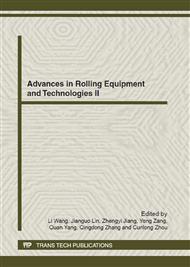p.1
p.7
p.13
p.19
p.25
p.31
p.37
p.43
Hot Rolling State Analysis Based on Kernel Principal Component Analysis and Information Entropy
Abstract:
With more and more process data acquired from manufacturing process, extracting useful information to build empirical models of past successful operations is urgently required to get higher product quality. Clustering is the important data mining methods, where feature extraction is a significant factor to ensure the accurate rate of clustering and classification. As a common non-linear feature extraction method, kernel principal component analysis (KPCA) uses the variance as the information metric, but the variance is not always effective in some cases. Since information entropy is nonlinear and can effectively represent the dependencies of features, the Renyi entropy is used as the information metric to extract the feature in this paper. Simulation data, Tennessee Eastman and hot rolling process data are used for model validation. As a result the proposed method has better performance on feature extraction, compared with traditional KPCA.
Info:
Periodical:
Pages:
7-12
DOI:
Citation:
Online since:
October 2012
Authors:
Price:
Сopyright:
© 2012 Trans Tech Publications Ltd. All Rights Reserved
Share:
Citation:


